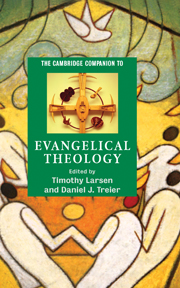Book contents
- Frontmatter
- 1 Defining and locating evangelicalism
- Part I: Evangelicals and Christian doctrine
- 2 The triune God of the gospel
- 3 Scripture and hermeneutics
- 4 Jesus Christ
- 5 The human person in the Christian story
- 6 Justification and atonement
- 7 The Holy Spirit
- 8 Conversion and sanctification
- 9 The church in evangelical theology and practice
- Part II: The contexts of evangelical theology
- Index
5 - The human person in the Christian story
from Part I: - Evangelicals and Christian doctrine
Published online by Cambridge University Press: 28 September 2007
- Frontmatter
- 1 Defining and locating evangelicalism
- Part I: Evangelicals and Christian doctrine
- 2 The triune God of the gospel
- 3 Scripture and hermeneutics
- 4 Jesus Christ
- 5 The human person in the Christian story
- 6 Justification and atonement
- 7 The Holy Spirit
- 8 Conversion and sanctification
- 9 The church in evangelical theology and practice
- Part II: The contexts of evangelical theology
- Index
Summary
“Who” and “what” is a human person? Depending on which pronoun takes priority, one can answer the “human question” scientifically, philosophically, theologically, morally, socially, or with a combination thereof. These modes of inquiry shape the way a given society negotiates what constitutes human being and personhood. In the process, society arbitrarily engages in “cultural shadow work.” It renegotiates the social order through continually redefining the “human being” and ends up shaping a new culture based on a particular set of values.
Although we have forever been asking and defining what it means to be human, the modern-postmodern shift to the human subject as the source and norm for “truth” has ultimately placed humanity (anthropology) at the center of every inquiry. While great strides have been made in understanding human being and personhood, new definitions arise out of new contexts. Present inconsistencies and ambiguities mean that there exist side by side rampant individualism and “communal identity,” abortion and assisted reproductive technologies, genetic engineering and euthanasia, without any sense of underlying discontinuity. This generally works to the advantage of those with the greatest amount of influence or the most to gain, often at the expense rather than on behalf of, “the other.”
Certain streams of contemporary thought emphasize a theological anthropology “from below,” using human experience as the source and criterion to determine divine reality, and encouraging the “construction” of one's own reality as “personal narrative.” Christian anthropology, however, does not start with “the phenomenon of human being” as a societal, individual, or even a theological construct. It starts with God.
- Type
- Chapter
- Information
- The Cambridge Companion to Evangelical Theology , pp. 65 - 78Publisher: Cambridge University PressPrint publication year: 2007
- 1
- Cited by

